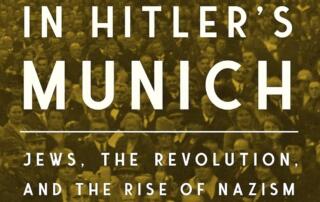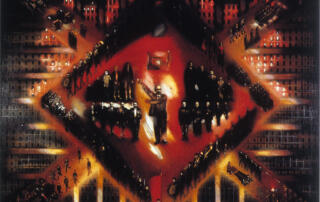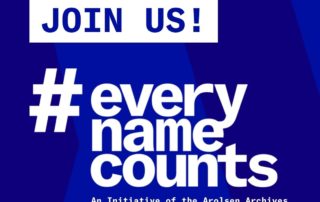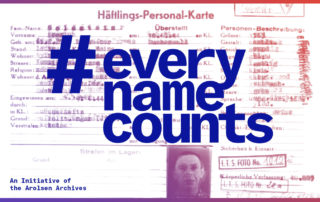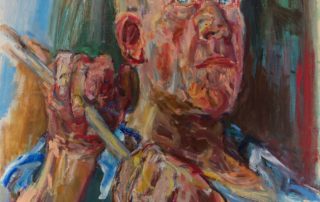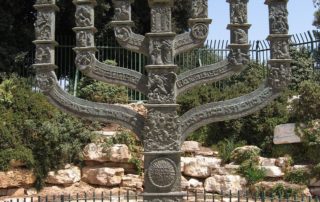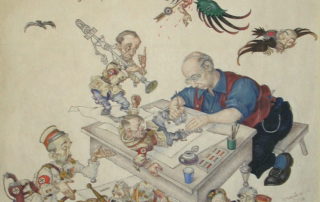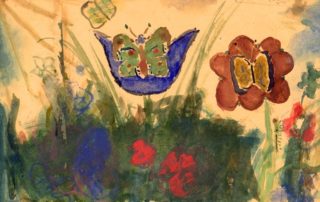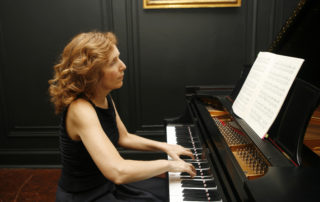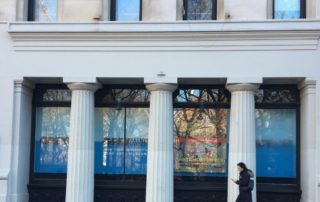Rachel Stern2024-01-31T18:36:36-05:00January 16th, 2024|Events, Lectures, Past Events|
In the aftermath of Germany's defeat in World War I and the failed November Revolution of 1918–19, which was led by many prominent Jewish politicians, the conservative government of Bavaria identified Jews with left-wing radicalism. Munich became a hotbed of right-wing extremism, with synagogues under attack and Jews physically assaulted in the streets. It was here that Adolf Hitler established the Nazi movement and developed his antisemitic ideas. This lecture provides a gripping account of how Bavaria's capital city became the testing ground for Nazism and the Final Solution. Michael Brenner holds the chair of Jewish History and Culture at Ludwig Maximilian University in Munich. He is also Distinguished Professor of History and Seymour and [...]
Rachel Stern2024-01-24T15:36:23-05:00December 26th, 2023|Events, Lectures, Past Events|
Fifteen years after the great financial crisis of 2008, which shook the capitalist economic system in America and Europe to its foundations, the book “The New Man as Man Machine” presents, for the first time, the interrelationship of art and political economy in the Weimar Republic, the Soviet Union, and the United States of America during the interwar period. By taking a look back at the 1920s and 1930s, it attempts to better understand our own era and its well-founded fears with regard to globalization and a new global economic crisis. Image above: Kliment Redko, Aufstand, 1924-25 This project focuses on how artists reacted to the central questions of the political economy in these three [...]
Rachel Stern2022-02-18T06:38:48-05:00January 20th, 2022|Events, Lectures, Past Events|
Become part of an international community that actively helps build the largest digital memorial to the victims of National Socialism. During this 48 hour challenge, we help the Arolsen Archives index documents from the Central Location Index (CLI) at Yad Vashem, which have never been indexed before. Every number, every place, and every name you type in on the crowdsourcing platform will help preserve the memory of the persecutees – and make sure we never forget what happened to them. This event features Elizabeth Berkowitz, our former Digital Interpretation Manager, who speaks about #everynamecounts at the Fritz Ascher Society, and Katharina Menschick from the Arolsen Archives, who introduces the Arolsen Archives and the current project. A [...]
Rachel Stern2022-02-18T06:42:00-05:00May 11th, 2021|Events, Past Events|
Join the Fort Tryon Jewish Center (FTJC) and the Fritz Ascher Society for a LIVE DATA ENTRY EVENT to help build the world’s largest digital monument to victims of the Holocaust: the Arolsen Archives’ #everynamecounts. THIS EVENT WAS NOT RECORDED. Opening Remarks Rabbi Guy Austrian Fort Tryon Jewish Center in New York Rachel Stern Director and CEO of the Fritz Ascher Society in New York Introduction and Moderation Elizabeth Berkowitz Digital Interpretation Manager of the Fritz Ascher Society in New York #everynamecounts is a crowd-sourced data entry initiative to return the names of Holocaust victims, their families, and details of their lives into the findable, keyword-searchable public record. Participants enter information about Nazi victims and family members from digitized [...]
Rachel Stern2022-02-18T06:37:23-05:00March 4th, 2021|Events, Past Events|
The International Tracing Service (ITS), since 2019 called Arolsen Archives, was established by the Allies in 1948 as a central search and information center. They house the world’s most extensive collection of documents about the victims of National Socialist persecution, including documents from Nazi concentration camps, ghettoes and penal institutions, documents about forced laborers, and documents from the early post-war period about Displaced Persons, mainly Holocaust survivors, former concentration camp prisoners, and forced laborers. People who had fled the sphere of influence of the Soviet Union for political reasons are also included. The archive's holdings consist of 30 million documents in total and belong to UNESCO’s Memory of the World. At this event, Floriane Azoulay (Director) and Giora Zwilling (Deputy [...]
Rachel Stern2022-02-18T06:04:58-05:00March 3rd, 2021|Events, Lectures, Past Events|
The Austrian artist Oskar Kokoschka (1886-1980) achieved world fame with his intense expressionistic portraits and landscapes. Rüdiger Görner, author of the first English-language biography, depicts the artist in all his fascinating and contradictory complexity. He traces Kokoschka’s path from bête noire of the bourgeoisie and a so-called ‘hunger artist’ to a wealthy and cosmopolitan political and critical artist who played a major role in shaping the European art scene of the twentieth century and whose relevance is undiminished to this day. In 1934, Kokoschka left Austria for Prague, and in 1938, when the Czechs began to mobilize for the expected invasion by the German Wehrmacht, Kokoschka fled to the United Kingdom, where he remained during the war. Although he [...]
Rachel Stern2022-02-18T07:06:06-05:00February 22nd, 2021|Events, Lectures, Past Events|
Born 1877 in Dortmund, the sculptor Benno Elkan (1877-1960) first studied painting in Munich and Karlsruhe. At the end of his studies, he turned to sculpture. As a young artist, he spent time in Paris, Rome, and Frankfurt. Elkan’s oeuvre was largely made up of commissions. In the beginning, he mainly created tombs. Medals, portrait busts of well-known personalities, monuments to victims and candelabras follow, partly for the religious (Jewish and Christian) context. Elkan fled persecution by the German Nazi regime to Great Britain in 1934and lived with his family in London until the end of his life. Perhaps the most important work besides the Menorah in Jerusalem (1956) was never built: Memorial to the Defenseless Victims of the Bombing [...]
Rachel Stern2022-02-18T06:31:18-05:00February 17th, 2021|Events, Lectures, Past Events|
During the first four decades of the twentieth century, Polish Jewish artist Arthur Szyk (1894–1951) was best known for his richly detailed book illustrations and magnificent illuminations on Jewish themes. He portrayed the Jews as a heroic nation that had resisted oppression through the ages and eventually triumphed. His Jews were fighters for their own freedom and the freedom of others. Szyk sought to redefine how the Jews viewed themselves and how others viewed them. His works thus challenged the notion that Jewish history was merely one long saga of suffering and, at the same time, refuted the then common antisemitic canard that the Jews were a cowardly people. With the coming to power in Germany of Adolf Hitler [...]
Rachel Stern2022-02-18T07:19:09-05:00January 11th, 2021|Events, Lectures, Past Events|
WATCH THE RECORDING OF THIS EVENT HERE. Visual art during and after the Holocaust, by victims and survivors eloquently contradicts the famous comment by Theodor Adorno that "after the Holocaust to make art is barbaric." On the contrary, it was and is necessary: as part of the record of events as they were transpiring, and as part of the human response to horror--to express anger, to raise questions, to offer healing--in the time after those events. Who creates the art and what kind of art is created? What role does it play in wrestling with the question of what God is and what we humans are? These issues have implications both from within the heart of the Holocaust and from well beyond its particular boundaries. [...]
Rachel Stern2022-02-18T07:23:41-05:00December 31st, 2020|Events, Lectures, Past Events|
Join the Museum of Jewish Heritage — A Living Memorial to the Holocaust, the German Consulate General in New York, and the Fritz Ascher Society for Persecuted, Ostracized, and Banned Art for a stirring performance of Enger’s Mischlinge Exposé, Live from Edmond J. Safra Hall™. The performance will be followed by a discussion between Enger and Rachel Stern, Founding Director and CEO of the Fritz Ascher Society. Carolyn Enger is a pianist based in the greater New York City area, with roots reaching back to Breslau, now Wroclaw, Poland. Her Mischlinge Exposé brings to light the stories of Mischlinge—a derogatory term used by the Nazis to describe people with both Jewish and Aryan ancestry—like her [...]
Dave2019-04-07T07:43:51-04:00December 20th, 2018|Events, Past Events|
April 3, 2019, 6:30-7:30pm J. English Cook: Gallery Conversation Grey Art Gallery at NYU, New York (please add map) Please join J. English Cook, Graduate Curatorial Assistant, Grey Art Gallery, and Ph.D. Candidate, Institute of Fine Arts, NYU for a gallery conversation. The event is sponsored by the Grey Art Gallery, New York University and The Fritz Ascher Society. It is part of Wunderbar Together: The Year of German-American Friendship 2018/19, an initiative of the Federal Foreign Office of Germany and the Goethe-Institut, with the support of the Federation of German Industries (BDI).
Rachel Stern2018-11-26T05:40:08-05:00September 4th, 2018|Newsletter|
Dear Friends, I know, this summer I seem obsessed with Fritz Ascher’s I know, this summer I seem obsessed with Fritz Ascher’s Dancers from 1921. But there is one more thought about the drawing that I want to share. Fritz Ascher, Dancers, 1921. Private collection. Photo Malcolm Varon ©2018 Bianca Stock Fritz Ascher, Dancers, 1921. Private collection. Photo Malcolm Varon ©2018 Bianca Stock When the drawing was created,“Freikörperkultur” (FKK) or “free body culture” had become popular in Germany. Founded in 1898 in Essen, Germany, the nudist culture was about celebrating the body unencumbered by clothes, in nature and sunlight. Many of the naturists came from the Wandervogel movement, the pre-eminent German youth movement, founded to escape the repressive and [...]


